-
CENTRES
Progammes & Centres
Location
 PDF Download
PDF Download 
Mannat Jaspal, Green Multilateralism: Partnerships, Finance, and Innovation (2021 India-Germany-EU Dialogue), February 2022, Observer Research Foundation and Konrad Adenauer Stiftung.
I. Introduction
Both India and the European Union (EU), as they seek paths to recovery from the economic and human devastation caused by the COVID-19 pandemic, intend to use the opportunity to increase the environmental and social sustainability of their economy. As the world searches for a more just, values-based, and greener growth, the India-EU partnership takes on new importance. The EU has been at the frontier of green development and policymaking, and India continues to strive to green its growth path. Their shared values and compatible economic structures can serve as an impetus for a renewed, global, green multilateralism.
Of India’s European partners, Germany is best placed to enhance cooperation on green multilateralism. Germany is India’s largest trade partner in the EU, which itself has a disproportionate share of India’s trade. They share a commitment to navigating the twin constraints of open strategic autonomy and multilateral institution-building. In both countries, the political leadership has a non-partisan commitment to growing and deepening the bilateral relationship—cooperation on green growth, the technological frontier, and climate change lead the list of areas where such depth is possible.
For this purpose, the Observer Research Foundation (ORF) and the India Office of the Konrad-Adenauer-Stiftung (KAS) organised a high-level delegation visit in October 2021, to the German capital of Berlin, as well as Brussels and Geneva, two other European centres of policymaking. It was determined that an in-person delegation, resuming contact that had been broken off due to the exigencies of the pandemic, had become essential to facilitate a series of discussions and meetings between prominent Indian and European policymakers. The aim was to refresh the subject of green multilateralism. Synergies must be drawn to enhance efficiency and leverage the principle of comparative advantage. Matters of potential partnerships, finance and innovation formed the core of the conversations, particularly regarding greening the pandemic recovery process while keeping in mind the twin goals of building resilience and driving sustainability.
II. The Policy Context
The Intergovernmental Panel on Climate Change (IPCC) report issued in August 2021 warns that global warming will cause global temperature to rise by more than two degrees Celsius from pre-industrial levels. The report found “unequivocal” evidence that rising temperatures will cause widespread and unprecedented catastrophic impacts, among them, a rise in sea levels, extremes in heatwaves and precipitation levels, and an increase in the frequency and intensity of floods, cyclones, and droughts.[1] Ecosystems will be threatened and populations displaced. Indeed, climate vulnerability has become nothing less than an existential threat, and there is even greater urgency for climate action and austere response measures on a global scale. The same IPCC report lays the onus of climate change on anthropogenic factors. This implies that limiting the effects of global warming and stabilising the climate is within our realm, but only if nations strictly commit to reducing greenhouse gas emissions (GHG) and realising their net-zero targets.
Yet, a fragmented and unilateral approach to fighting climate change will fail to address the problem of rising global temperatures and puts forth a cause for a global reckoning. Even as multilateralism is struggling for legitimacy amidst rising geopolitical tensions and economic de-coupling, global cooperation and climate diplomacy will have to underpin climate change mitigation and adaptation efforts on a global scale. India and Germany, in their pursuit for a global green transition, can help revive, repurpose and recalibrate our approach to multilateral problem-solving.
India and Germany are natural trading and technological partners, as demonstrated by the composition and size of their bilateral trade. A recovery from the pandemic that enhances growth and productivity is one that will prioritise technologically advanced sectors of the economy, particularly those that will help both countries achieve their goals of climate neutrality. Any global solution to the question of green multilateralism will also inevitably involve discussions on technology transfer, intellectual property rights, and shared regulatory regimes. Both India and the EU are at the forefront of discussing how big tech can be harnessed to aid national recovery and resilience efforts, and are early movers in new questions of digital regulation and revenue-sharing. India and Germany, in particular, share a specific commitment to creating an enterprising, well-ordered, and attractive start-up sector that drives innovation and entrepreneurship.
Both India and the EU are large and complex polities with great diversity in ideology, interests, and principles while also being held together by shared democratic principles. Questions of regional and community justice are central to discovering the appropriate path for a green recovery, and matters of international justice are always crucial to discussions on global climate action. ORF and KAS agree that questions of justice and livelihoods are best addressed by politicians; they are, after all, accountable to the people. In both India and the EU, the search for strategic autonomy can sometimes be misinterpreted as “unilateralism”. This can only be addressed if frank discussions take place amongst political leaders and influencers, as part of the policymaking process.
Thus, the direct policy and political context poses a challenge for green multilateralism, since there are multiple constraints on how much can be spent, concerns among the political class about jobs and livelihoods have grown, and there is divergence on how greater climate ambition can best be expressed at a global level. India has set a climate-neutral target but continues to stress the importance of differentiated responsibility. Distinctions in position between India and the EU on green multilateralism may become significant only if they are not addressed early through a clear exchange of views.
III. India Delegation
The delegation comprised the following Indian dignitaries and thought leaders:
1) Mr Jayant Sinha, Member of Parliament and Chair, Parliamentary Standing Committee for Finance, India; former Minister of State for Finance and Minister of Civil Aviation 2) Ms Priyanka Chaturvedi, Member of Parliament (Rajya Sabha) and Deputy Leader, Shiv Sena 3) Dr Amar Patnaik, Member of Parliament (Rajya Sabha) and National Spokesperson and Head, IT Wing, Bharatiya Janata Dal 4) Ambassador Lakshmi Puri, Former Assistant Secretary-General, UN, and Former Deputy Executive Director, UN Women 5) Mr Gaurav Gogoi, Member of Parliament (Lok Sabha) and Deputy Leader of Indian National Congress in Lok Sabha 6) Mr Madhukeshwar Desai, National Vice-President, Bharatiya Janata Yuva Morcha (BJYM) 7) Dr Samir Saran, President, Observer Research Foundation 8) Mr Peter Rimmele, Resident Representative to India, Konrad-Adenauer-Stiftung 9) Mr Mihir Sharma, Director, Centre for the Economy and Growth, Observer Research Foundation 10) Mr Pankaj Madan, Deputy Head, Konrad-Adenauer-Stiftung India Office 11) Ms Mannat Jaspal, Associate Fellow, Observer Research Foundation
The delegation was a reflection of India’s great diversity. Legislators and dignitaries were chosen from multiple political parties, with significant variation in age, gender, and experience—and thus could offer different perspectives on India’s green ambitions.
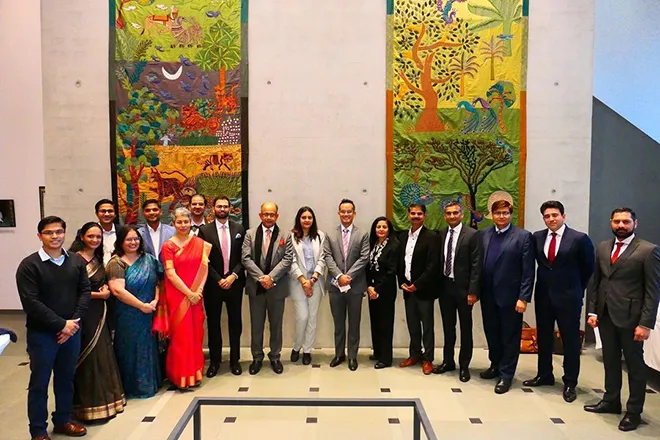
Indian Parliamentary Delegation at the Embassy of India, Berlin (Germany)
The delegation visited Berlin as well as the cities of Brussels and Geneva, which are home to prominent institutions that wield influence on the multilateral relations between India and the EU at multiple levels: international, national, and bilateral.
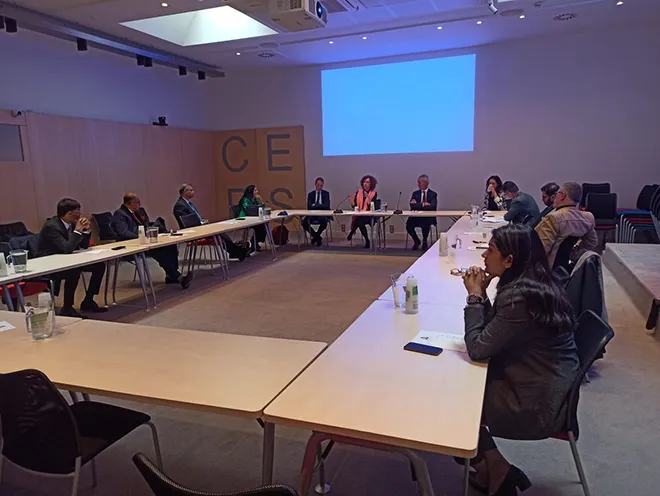
Indian Parliamentary Delegation interacting with members from the Centre for European Policy (CEPs), Brussels (CEPS members - Steven Blockmans, Stefania Benaglia, Mr Karel Lannoo (CEO) and Amb. Romana Vlahutin)
IV. Key Discussion Points
A series of discussions took place between the members of the delegation and their counterparts in Germany and the EU over seminal matters pertaining to green multilateralism, including the following: India-Germany and India-EU relations; climate policy; trade and investment; technology transfer; and the importance of ensuring a just green transition.
Discussions on the India-Germany and India-EU bilateral relationship were informed by the Federal German Government’s Indo-Pacific strategy, released on 2 September 2020, and followed a year later by the European Council’s approval of an Indo-Pacific strategy.
Indian, German and European policymakers agreed on the fundamental engines of the relationship, which matched those identified in the German Federal Government’s policy guidelines. Broadly, these are: diversification and strengthening of the economic network supporting supply chains and trade, and cooperation on energy transition and climate change remain central to the India-EU relationship, which has the potential to remake the Indo-Pacific itself.
EU Ambassador Romana Vlahutin noted: “There exists a great deal of optimism in the relationship between India and the EU. It is driven by a geopolitical as well as an economic imperative to strengthen our bilateral relationship. The world is very cognisant of India’s role and position as a security provider in terms of military, economic and ecological stability. Our Indo-Pacific strategy is an inclusive one and we will be pleased to partner with India on key matters of the future.” She added, “We need a global governance framework and we must put trust in our multilateral institutions. Democracy has come face to face with rising authoritarian regimes across the world and we must partner together to stay true to our ideals and values of upholding and strengthening our core democratic values. At the same time, our understanding of these values must also expand. EU aims to build and develop stronger connectivity ties with our partner nations which goes beyond cross-border land connectivity and extends to the realms of digital, energy and human connectivity as well. I see India as a strong partner for EU to innovate and build on these thematic areas and develop a competitive edge together.”
All dignitaries and members in attendance echoed the sentiment of green multilateralism as the bedrock and catalyst for all other forms of multilateralism between the two. A common commitment to sustainable, reliable and resilient infrastructure as the backbone of shared security was evident.
Earlier in their meetings in Berlin, the delegation stressed that points of convergence exist between India and Germany across matters of national security, trade and investment, and climate change, and therefore, building trust and strengthening capacities between the two countries is of primary importance. It witnessed clear support among German parliamentarians for a closer relationship with India. Experts and Indian stakeholders in Berlin helped the group identify the sectoral and people-to-people links that underline this growing closeness. Briefings also pointed out that this growing political bonhomie is being matched with expansion in areas of trade, investments, technology, standards and sharing of best practices. German corporate investment into India, particularly in high-value manufacturing, is of a side nature, and German FDI into India from April 2000 to September 2021 is estimated over USD 13 billion.
The delegation concluded that India and Germany are committed to working together to drive the digital transformation through innovation and frontier technologies, especially artificial intelligence, making economic growth sustainable by cooperating on climate change, creating space for people-to-people contacts through legal mobility of skilled labour, and contributing to a reliable international order by strengthening and updating multilateral institutions.
According to the UN’s IPCC report, an annual investment of USD2.4 trillion—almost 2.5 percent of the world’s economy—is required in the energy system alone until 2035 to limit global temperature levels from rising above 1.5-degree Celsius from pre-industrial levels.[2] Altogether, developing countries will require additional investments of almost USD600 billion annually in the period between 2020 and 2050 to make the necessary transitions in the energy sector—the estimated requirement for India alone is at least USD150 billion per year, or about 2 percent of the country’s GDP.[3] The commitment of USD100 billion in climate finance from developed countries to the developing nations, as reaffirmed by the Paris Agreement in 2015, is therefore small when set against the enormous amounts of capital required to support the green transition. Nor are all members of the OECD group of countries contributing to meeting this goal. Discussions at the latest UN Climate Change Conference, COP26, also focused on extending the climate pledge target by a few years, initially set at 2020.[4]
In this context, the Indian delegation and their interlocutors in Brussels and Berlin widely agreed on the centrality of private climate finance to increasing green ambition at the multilateral and bilateral levels. Mr Jayant Sinha’s view represented a broad consensus: “Given the large capital requirements for the energy transition and the failure of initiatives like the COP to mobilise the requisite climate finance, the green transformation has to be led by the private sector instead of the government. The role of governments should be only to facilitate an open and market-friendly environment and encourage greater private financial flows and technology transfer between countries. We need to green the invisible hand and companies should be incentivised and nudged to get on the transition bandwagon.”
One of the crucial hurdles to integrating the climate finance mechanisms in India and the EU is the regulatory disconnect between the two jurisdictions. India has taken significant steps in the recent past towards enhanced standards when it comes to reporting sustainability.[5] The EU’s green taxonomy for finance, however, is further along than its Indian counterpart. In their current forms, climate disclosure guidelines are not compatible between India and the EU—an issue the Indian delegation repeatedly highlighted. Deliberations were held on how to create institutional linkages that could lead to a process of harmonised regulations and reporting frameworks between the two jurisdictions.
Germany is India’s largest trading partner within the EU. Prior to the pandemic in 2019-20, the EU itself was India’s largest trading partner. The EU is also the second-largest destination for Indian exports (14 percent of the total). Trade in services between the EU and India reached 32.7 billion euro in 2020. The EU is also the most sustained source of FDI in India, with European FDI to India in 2019 totalling 75.8 billion euro.[6]
Both jurisdictions must safeguard this mutual economic cooperation between India and the EU. In their visit, the delegation focused on the interaction between trade, investment, and climate change. The effects of climate change and the pandemic have the potential to disrupt supply chains and trade and impact the economic and social outcomes of millions of people associated with the value chain. The delegation underlined the need for cooperation on climate change for preserving the trading relationships between the two countries.
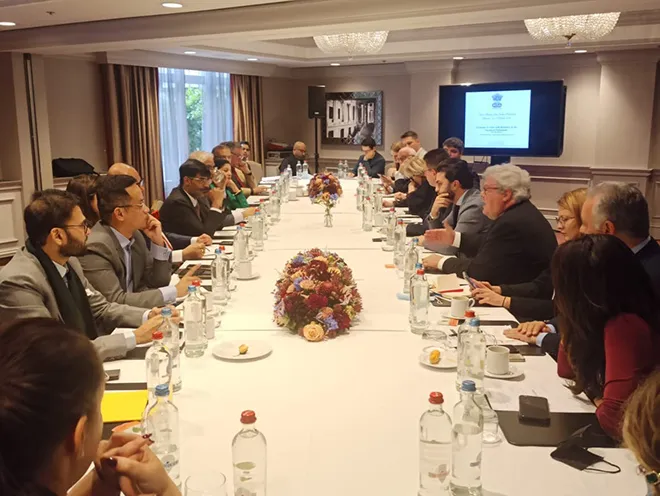
Indian Parliamentary Delegation interacting with the Members of the European Parliament, Brussels
Discussions on areas of potential investment followed. India is ranked third on renewable energy investment.[7] Delegates pointed out that this sends the right policy and market signals to global investors about the political commitment and market readiness of the Indian green market.
Mr Madhukeshwar Desai and others pointed out that deeper trade connections should not be viewed from the prism of goods only but also include services: “We need to foster a deeper engagement with Europe across both multilateral and bilateral channels on both goods and services trade.”
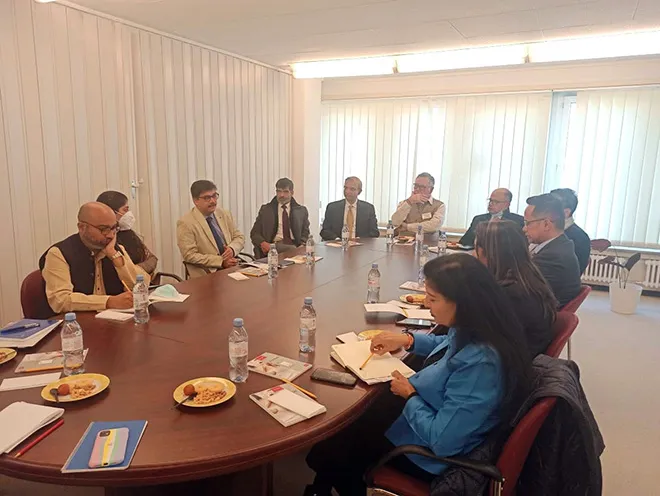
Indian Parliamentary Delegation at the WTO Permanent Mission with His Excellency Mr. Brajendra Navnit, Indian ambassador & Permanent Representative of India, Geneva
The Geneva leg of the delegation’s visit focused on managing green multilateralism in the context of cooperation at the WTO. Environment and sustainability have become important concerns for the functioning of the WTO. One European ambassador to WTO remarked during a KAS-organised roundtable, which was moderated by KAS Representative Olaf Wientzek: “WTO is an important institution and is responsible for sending the right market signals. Even though trade may not be the prime area of focus at COP but everything in COP will influence trade and in turn, investment flows. We are pleased to see India’s commitment to climate action and willingness to be a part of the solution in a multilateral framework. But we must be cognisant that these will be tough negotiations and will all need to be open to compromise.” The delegation learned that the WTO can play an instrumental role in ensuring compliance with internationally agreed carbon prices, settling dispute, and fostering a redistributive mechanism discussed in the previous section.
Once again, members particularly stressed the role of the private sector in strengthening the multilateral ties between the two nations. It is within this context that Mr Amar Patnaik stated that just as private companies have been critical in the fight against COVID-19 by producing vaccines in such a short timeframe, a similar commitment and expedition should be demonstrated in achieving the Sustainable Development Goals (SDGs). A green transition will be an opportunity for the industrial sector to expand its scope of production and build more sustainable supply chains.
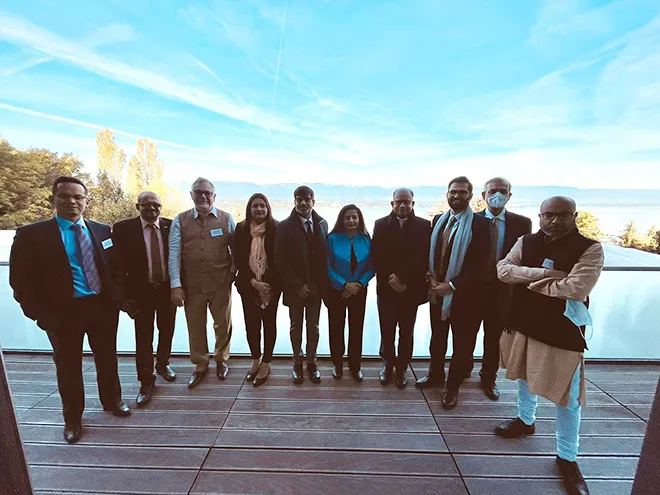
Indian Parliamentary Delegation at the World Economic Forum, Geneva. From L-R: Gaurav Gogoi, Pankaj Madan, Peter Rimmele, Priyanka Chaturvedi, Samir Saran, Lakshmi Puri, Amar Patnaik, Madhukeshwar Desai, Jayant Sinha, Mihir Sharma
|
The Carbon Border Adjustment Mechanism (CBAM): A Conversation The utility of exchanges such as that conducted by the ORF-KAS delegation is exemplified by the discussions in which it engaged regarding sensitive areas of disagreement, such as the Carbon Border Adjustment Mechanism (CBAM) that is proposed as part of the European Green Deal. This box discusses the views outlined by the delegation and its interlocutors, and how methods were proposed and discovered for avoiding a negative fallout on the relationship between India and Germany as well as India and the broader EU. In one discussion, the Indian delegation stressed the importance of common but differentiated responsibilities for climate change, which protect developing countries’ right to grow and trade—the UN Framework Convention on Climate Change specifically mentions a “common but differentiated responsibility based on respective capabilities”. The Indian delegation’s members emphasised that, as the world develops a net-zero consensus, India is over-achieving on its hard commitments in the Paris Accords. They argued that while it is important for all countries to ramp up their Nationally Determined Contributions (NDCs), it will be a travesty of climate justice if developed nations that have proliferated at the cost of environmental stability fail to support middle- and low-income nations that have the twin goals of driving sustainability with development still ahead of them. This was the context for the discussion on CBAM. According to European Climate Law, the EU has set itself a binding target to achieve carbon neutrality by 2050 and cut 55 percent of its carbon emissions by 2030. The ‘Fit for 55’ package is a set of propositions that aim to align current EU laws with its 2030 and 2050 ambitions. One of the suggestions is the revision of the EU emissions trading system (EU ETS) to expand its ambit to include additional sectors. The Indian delegation initially expressed the view that the CBAM was simply a new method for trade restriction and protectionism on the part of the EU. “It is not a tax but a non-tariff bargaining that will be imposed on developing countries by misusing the TBT (technical barriers to trade) agreement,” said Ambassador Lakshmi Puri. But their interlocutors in Germany and Brussels argued that CBAM was, in fact, created as a corollary to the EU ETS, to be piloted from 2024 and officially enforced from 2027. In an effort to decarbonise domestic sectors, the EU will continue to increase carbon prices. The CBAM was introduced to prevent domestic producers from shifting production to countries with less ambitious policies—it will equalise prices between domestic products and imports to avoid a carbon leakage. Importers will have to report and pay for the embedded emissions in certain carbon-intensive products (initially, aluminium, cement, iron and steel, electricity and fertiliser). Mr Marc Vanheukelen, EEAS Climate Ambassador, assured the delegation that “the CBAM will be completely compatible with the WTO rules. It follows the three cardinal principles of non-discrimination between foreign and domestic producers; non-discrimination between foreign producers and proportionality between measure and the environmental goal.” As a potential area of collaboration, he added that the EU can help India set up its own emissions trading scheme by sharing its expertise on carbon pricing models. “Our commitment to the Net-Zero is as much an industrial policy as it is a moral commitment. It is a race to the Net Zero and we believe that our carbon neutral policies will make us competitive in the markets of the future. Therefore, we must ensure that the prices of carbon remain high,” asserted Mr Jacob Werksman of the Directorate General, CLIMA. The Indian delegation agreed to the rationale behind raising carbon prices as an effective means to encourage carbon-efficient means of production but voiced major concerns about the method of implementation of CBAM. They made a strong case that any CBAM might have serious implications for the relationships between the two countries, and deep, continuing and serious deliberations on its applicability and roll-out would be critical. They argued that Germany and the EU must make efforts to gain a buy-in from at least a like-minded subset of their trading partners and be particularly cognisant of the realities in developing countries while assessing the applicability and imposition of such a regulation. The discussion then centred on how the EU could soften the blow of such a regulation on the developing countries that are its trading partners. One proposed solution was that border adjustment mechanisms be anchored in a process that includes other forms of integration or transfers—implying, in effect, a broader carbon market with a redistributive mechanism. The delegation and its interlocutors agreed that CBAM would only be effective from a global point of view if accompanied by measures to ease the green transition in developing economies. European lawmakers in Brussels informed their Indian counterparts that CBAM revenues were already earmarked for refinancing debt obligations brought on by the pandemic and could not directly be shared with trading partners. They suggested, however, that the trade-off for CBAM be a public framework to support investments in developing countries via private companies. The delegation and its interlocutors agreed that policy shifts that implicate a relationship as crucial as that between India and the EU should have taken place with greater prior discussion at all levels. It was resolved that any final implementation of the CBAM proposal would be presaged by greater engagement of vital strategic partners and that it would be integrated with other solutions that upheld the rights of developing economies in the trading sphere. |
Green technologies are critical to the fight against climate change. They have the potential to expedite the process of decarbonisation and increase efficiency in the renewable sector. Discussions focused on how green technologies can overcome the viability and financing gap, and how they can be disseminated and adapted across geographies. The importance of research and development and innovation in green technologies was emphasised during the interactions. Given that both India and the EU have made considerable strides in the scientific sphere, Ms Priyanka Chaturvedi emphasised on potential collaboration on advancing technologies such as green hydrogen, plant protein, battery storage and carbon capture systems.
Mr Marc Vanheukelen added, “Today, green hydrogen is four times more expensive than grey hydrogen. Indian and EU scientists must collaborate and innovate new technologies and find alternatives to carbon-intensive products in sectors such as energy, agriculture and power.” He noted that new frontiers in green technology are constantly developing: “Nuclear fusion will be the energy of the future and we must join hands in harnessing its complete potential.”
The political interlocutors on both sides stressed the importance of the decarbonisation process being socially and politically sustainable—which would require that the benefits of the transition be shared in an equitable and just manner. Several European parliamentarians discussed mechanisms with their Indian counterparts on managing the transition away from fossil fuels in a just and inclusive manner, as well as using directed investment through the European Green Deal to reduce regional inequality.
The delegation and their interlocutors agreed that climate change will have a disproportionate social and economic impact on the poorest and marginalised populations. Thus, Mr Gaurav Gogoi observed, policies should be designed to address not just carbon mitigation but the social challenges that will arise as a consequence of climate change. The delegation concluded, after examination of the European Green Deal, that the green multilateralism discourse must widen its aperture from environmental protection to include social protection as well. Greater integration of policies and people is necessary to build resilience and spur growth. Post-pandemic recovery efforts should bring both environmental and social parameters into its ambit.
The delegation was also informed of cutting-edge research in Germany and Europe on technology to aid the green transformation of manufacturing and agriculture. “India has a demographic dividend and Europe has expertise in technology. Marrying the two will leapfrog our green recovery process,” said Mr. Jeremy Jurgens. “The right policy interventions and investments can help raise employment levels, raise per capita incomes, and improve socio-economic outcomes.” This was identified as an important area for capacity-building on cooperative sustainable modernisation efforts in the future.
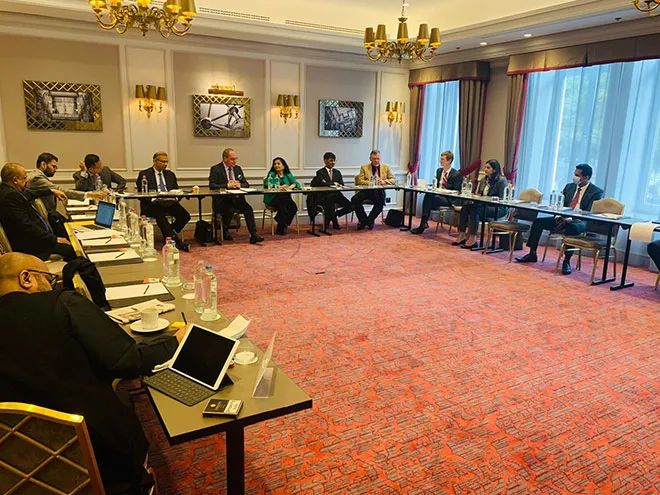
Indian Parliamentary Delegation interacting with Mr Marc Vanheukelen, EEAS Climate Ambassador, Brussels
V. Conclusion: The Search for New Ideas
Though climate change remains a priority for both India and the EU, initial discussions demonstrated that there exists a considerable amount of distrust on the subject. Over the course of the delegation’s visit, the value of such high-level engagement between practicing policymakers became clear, as it streamlined their understanding of the constraints and allowed them to plan for future cooperation.
Delegates discussed a wide array of topics to further the cause of green multilateralism. There was consensus on some subjects but strong dissenting views on others. Yet, the different perspectives were aired in a collegial atmosphere. The delegation endeavoured to better understand the values and political realities that underlie choices such as CBAM and the European Green Deal. Towards the end of the visit, a clearer understanding was built of the need to ensure that policies such as the European Green Deal work with, and not against, policies for the green transition being put into place in India.
The political members of the delegation identified several ideas for new directions in policy research and mutual cooperation in green multilateralism. One such was the establishment of ‘climate clubs’, a grouping of nations that share a common vision and commitment to climate action. Climate clubs would share responsibility for decarbonisation while also preserving the spirit of differentiated responsibility. Conceptually, a climate club would induce cooperation between the global North and global South to facilitate the easier movement of climate finance and technology between the member nations. Shared regulations, a harmonised but not identical approach towards carbon pricing or taxation, and interlocking carbon neutrality commitments can all be pillars of such a club.
Mr Sinha remarked, “Investing in the energy transition in emerging economies like India is cheaper than in developed countries due to low marginal costs. Therefore, we need to create a global mechanism that allows investment dollars to flow wherever the marginal cost of reducing emissions is the lowest.” This, he said, would lead to an optimal allocation of per-dollar capital and an efficient path for carbon reduction. Discussions around an enforcement mechanism for such a climate club followed, where a ‘stick and carrot’ approach was understood to be an effective way to galvanise action on climate change.
Ideas such as creating a ‘Climate Club’ show a willingness on both sides to find ways to ensure that there is an institutionalised mechanism for further cooperation on green multilateralism that respects the political and economic imperatives of both sides. Such ideas emerge from the natural practicality of professional political consensus-builders when exposed to the concerns of the other side of the debate.
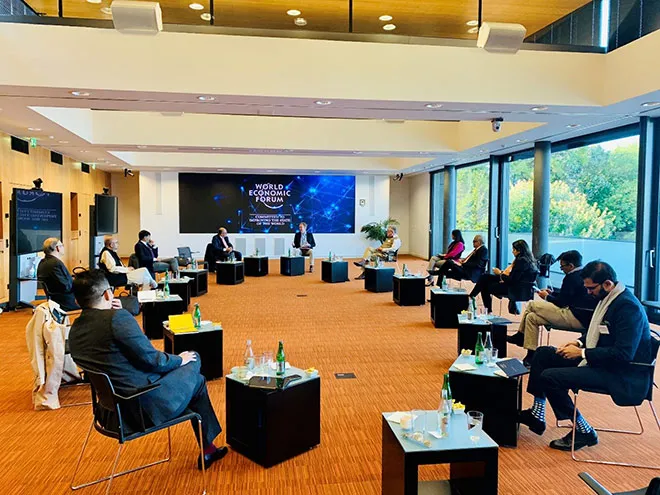
Indian Parliamentary Delegation with Mr Børge Brende, President, World Economic Forum, Geneva
Climate action hinges on our ability to cooperate and compromise. Greater political willingness and collaboration will be key to both mitigating and adapting to climate change. The delegation and their interlocutors repeatedly stressed that the India-EU partnership was essential to the future of global green multilateralism, and should not be allowed to flounder on account of differing perceptions of the mechanisms and actions required to revive green multilateralism. Given the depth and diversity of democracy in both jurisdictions, it was reaffirmed that constant discussions about the reasons for policy choices would build an appreciation of mutual constraints and shared possibilities.
Endnotes
[1] Intergovernmental Panel on Climate Change, Sixth Assessment Report, Switzerland, IPCC, 2021.
[2] Sophie Yeo, “Where Climate Cash is Flowing and Why It’s Not Enough,” Nature, September 17, 2019.
[3] Montek Singh Ahluwalia and Utkarsh Patel, “Getting to Net Zero: An Approach for India at CoP-26,” Centre for Social and Economic Progress (CSEP) Working Paper 13, September 2021.
[4] Jacelyn Timperley, “The Broken $100-Billion Promise of Climate Finance — And How to Fix It,” Nature, October 21, 2021.
[5] “Business Responsibility and Sustainability Reporting by listed entities,” Securities and Exchange board of India, May 10, 2021.
[6] European Commission, “Trade > Policy > Countries and Regions > India”, European Commission.
[7] “India is the world's fifth-largest energy economy; Ranked 3rd on renewable energy,” Economic Times, May 6, 2020.
The views expressed above belong to the author(s). ORF research and analyses now available on Telegram! Click here to access our curated content — blogs, longforms and interviews.

Mannat Jaspal is currently serving as a Director & Fellow - Climate and Energy, at the ORF Middle East, UAE. Her research delves into the ...
Read More +